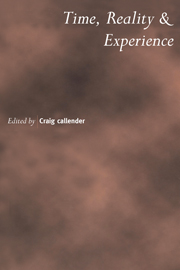Book contents
- Frontmatter
- Contents
- Preface
- Notes on Contributors
- When Time Gets Off Track
- Burbury's Last Case: The Mystery of the Entropic Arrow
- Zeno's Arrow and the Significance of the Present
- Presentism, Ontology and Temporal Experience
- A Presentist's Refutation of Mellor's McTaggart
- Time and Degrees of Existence: A Theory of ‘Degree Presentism’
- McTaggart and the Truth about Time
- On Absolute Becoming and the Myth of Passage
- Time Travel and Modern Physics
- Freedom from the Inside Out
- On Stages, Worms and Relativity
- On Becoming, Cosmic Time and Rotating Universes
- How Relativity Contradicts Presentism
- Can Physics Coherently Deny the Reality of Time?
- Rememberances, Mementos, and Time-Capsules
On Becoming, Cosmic Time and Rotating Universes
Published online by Cambridge University Press: 05 May 2010
- Frontmatter
- Contents
- Preface
- Notes on Contributors
- When Time Gets Off Track
- Burbury's Last Case: The Mystery of the Entropic Arrow
- Zeno's Arrow and the Significance of the Present
- Presentism, Ontology and Temporal Experience
- A Presentist's Refutation of Mellor's McTaggart
- Time and Degrees of Existence: A Theory of ‘Degree Presentism’
- McTaggart and the Truth about Time
- On Absolute Becoming and the Myth of Passage
- Time Travel and Modern Physics
- Freedom from the Inside Out
- On Stages, Worms and Relativity
- On Becoming, Cosmic Time and Rotating Universes
- How Relativity Contradicts Presentism
- Can Physics Coherently Deny the Reality of Time?
- Rememberances, Mementos, and Time-Capsules
Summary
Abstract
In the literature on the compatibility between the time of our experience and the time of physics, the special theory of relativity has enjoyed central stage. By bringing into the discussion the general theory of relativity, I suggest a new analysis of the misunderstood notion of becoming, developed from hints in Gödel's published and unpublished arguments for the ideality of time. I claim that recent endorsements of such arguments, based on Gödel's own ‘rotating’ solution to Einstein's field equation, fail: once understood in the right way, becoming can be shown to be both mind-independent and compatible with spacetime physics. Being a needed tertium quid between views of time traditionally regarded as in conflict, such a new approach to becoming should also help to dissolve a crucial aspect of the century-old debate between the so-called A and B theories of time.
Introduction: the shift from STR to GTR and the centrality of becoming
In the literature on the relationship between the time of our experience and the time of physics, the special theory of relativity (STR) has curiously but undoubtedly played a major role. On the assumptions that
(i) becoming (the ‘flow of time’) is the essential feature of experienced time;
(ii) objective (i.e. mind-independent) becoming presupposes an ontological difference between present and future events or state of affairs;
(iii) the geometrical structure presupposed by STR is a necessary constraint that physical time in general must meet,
a solution to the problem of the definability of becoming in Minkowski spacetime has also been regarded as the main way to solve the question of the compatibility between the time of physics and the time of our experience.
- Type
- Chapter
- Information
- Time, Reality and Experience , pp. 253 - 276Publisher: Cambridge University PressPrint publication year: 2002
- 5
- Cited by



